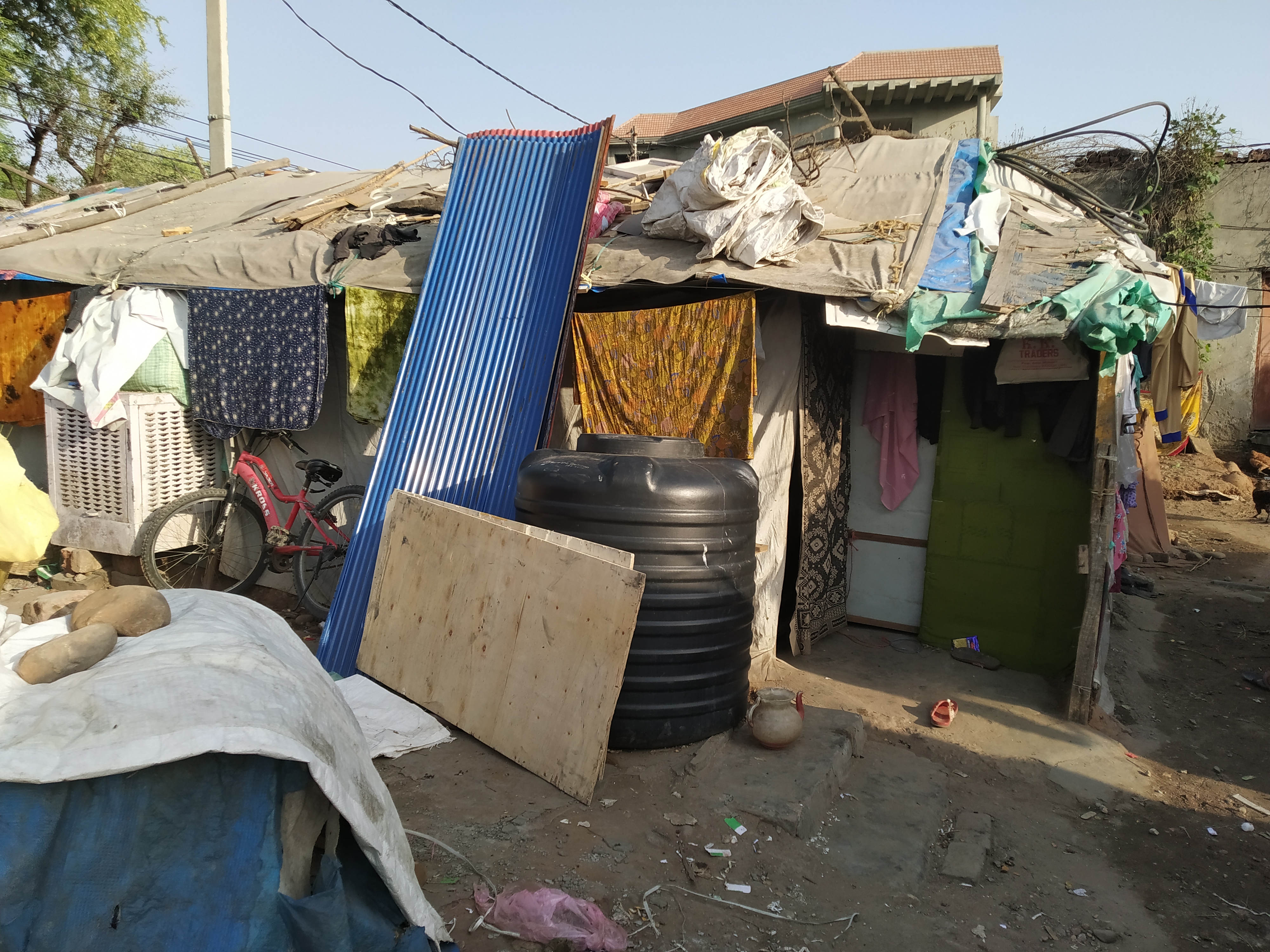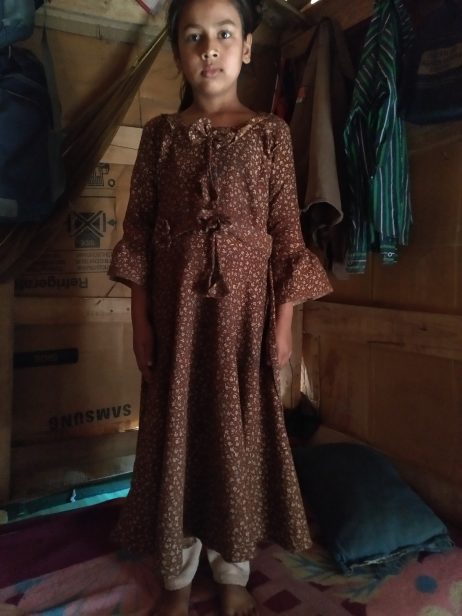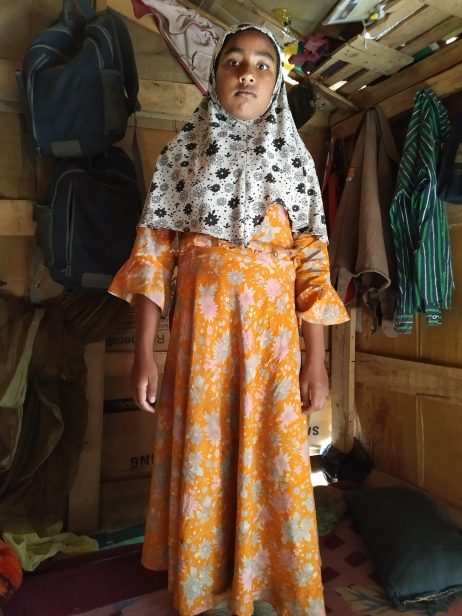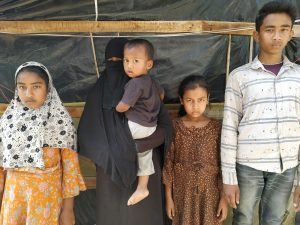The last time 12-year-old Rubina Begum saw her mother was a year ago when she was being taken away by policewomen in India’s Jammu region. Her mother, Hasina Begum, was among 170 Rohingya refugees who were detained and sent to a holding center as part of a refugee verification process.
A year later, Rubina said, the same policewoman informed them that her mother had been deported to Myanmar, the country from which she had fled to escape genocidal human rights abuses in 2012. Myanmar officially denies the existence of the Rohingya, a largely Muslim ethnic group that has lived in northern Myanmar for over a thousand years, instead labeling them “Bengalis,” illegal immigrants from Bangladesh.
The Indian government, for its part, has called the Rohingya who sought asylum in India “illegal immigrants” and a “threat to national security.” The Indian Supreme Court in 2021 refused to stop the deportation of Rohingya refugees.
In a shanty made of cardboard, tarps, and rags, Rubina huddled with her younger sister, Noor, and elder brother, Hussain Ahmad. She said they had not been able to see her mother for a whole year and then suddenly they were informed that their mother had been sent back to Myanmar.
“The police told us she was sent to Myanmar on March 15. They told us we will also be sent back,” said Rubina.
Prem Kumar Modi, superintendent of the Hiranagar Holding Center, told The Diplomat that they had detained 235 Rohingya refugees, of whom around 20 are minors. “We have completed the verification process. When and if the government asks us to deport them, we will follow the orders,” Modi said.
He said Begum’s verification was completed and there was also confirmation from the Myanmar side. “We cannot deport anyone without due process. There is a process that is followed by the Home Ministry, who are in communication with the Myanmar government,” he added.
What scares Rubina and her siblings is the thought of what might happen to their mother in Myanmar. Rubina said there are no Muslims left there and that her mother might be killed by the Myanmar military.
Rubina’s aunt, Nur Fatima, shared the same concern. “Maybe she will be killed there. We are hoping she is sent somewhere safe but there is no safe place for her in Myanmar. She will either be tortured every day or maybe raped or killed. Because that is what the military has been doing with us there,” Fatima told The Diplomat.
She said it was cruel on part of the Indian government to separate children from their mother. “They are not able to sleep,” she said.
The Myanmar military has committed “genocidal acts” against the Rohingya, in the words of a U.N. fact-finding team. The army has been accused of killing thousands of Rohingya, burning their villages, and engaging in a campaign of rape and torture targeting the Muslims, who are a minority in the Buddhist-dominated country.
The atrocities against the Rohingya forced nearly a million people to flee Myanmar and take refuge, the vast majority in Bangladesh but also in India. The refugees live in abject poverty, without access to basic amenities.

The shanty where Begum’s family resides in Jammu. Photo by Haziq Qadri.
According to the advocacy group Human Rights Watch (HRW), India hosts about 40,000 Rohingya refugees living in camps and slums in different cities and regions, including Jammu, Hyderabad, and New Delhi. Around 5,000 refugees are in Jammu, where they live in makeshift houses or shanties.
In March 2021, when 170 refugees were detained for the identification process, they were then sent to a holding center in Hiranagar jail, some 60 kilometers from the city proper. A year later, the number of those detained swelled to 235, according to HRW.
Ali Johar, who represents the Rohingya Human Rights Initiative, told The Diplomat the deportation of Begum to Myanmar was tantamount to returning a victim to her abusers.
“The United Nations has declared it a genocide and the Indian government has just handed over a victim to those who are raping and killing Rohingya Muslim women,” Johar said.
He added that he failed to understand how a country like India can take such a step without considering any humanitarian grounds. “It’s a violation of basic human rights,” he said.
On March 31, HRW said in a statement said the government’s forced return of a Rohingya woman to Myanmar highlighted the life-threatening risks facing Rohingya refugees in India. It said international law prohibits the forced return of refugees to places where their lives or freedom would be threatened.
“The Indian government gains nothing by forcibly returning a Rohingya woman to Myanmar, while she is separated from her children and put at grave risk,” the statement quoted Meenakshi Ganguly, the South Asia director at HRW, as saying. “The government’s decision to expel Rohingya refugees despite mountains of evidence that their lives and freedoms would be at risk in Myanmar shows cruel disregard for human life and international law.”
A day after HRW’s statement, the Jammu and Kashmir Police detained 25 more Rohingya refugees who were part of an apolitical religious group. They too have been sent to the holding center in Hiranagar jail in the Jammu region.
A Divided Family

Hasina youngest daughter, Noor. Photo by Haziq Qadri.
In a video statement that was shared on social media, Begum’s 9-year-old daughter, Noor, was seen holding her mother’s photo and pleading with the Indian government to bring her mother back.
Begum’s son, Hussain, who studies at a madrassa, said he was afraid of what might happen to his mother. “Someone from Hiranagar jail sent us a photo of our mother and said she will return to us. Then we came to know that she has already been sent to Myanmar,” Hussain said.
He added that policemen even threatened the children, saying that they should go back to Myanmar. “They said we should either go back or they would kill us and send our bodies back,” 15-year-old Hussain said.
For someone of her age, Rubina has kept herself updated with the Rohingya refugee issue. At the beginning of our conversation, she pointed out that “America has also termed it genocide.” She was referring to the U.S. State Department’s March statement, wherein it formally determined that violence committed against the Rohingya minority by Myanmar’s military amounts to genocide.
Begum and her family fled to Jammu in 2012. Hussain, just five years old at the time, said he did not remember much about what happened in his former homeland except for a faint memory. He repeatedly said that the military killed children or set them ablaze. “They snatched everything from us. We were thrown away.”
Rubina said she would go back to her country only if every Muslim refugee returned and the situation there is safe for the Rohingya. “For now, I want my mother back. We don’t know what will happen to her. I have not seen her in a year,” she said.
Anti-Rohingya Sentiments
India has seen a growing sentiment against Muslims ever since the right-wing Hindu nationalist Bharatiya Janata Party (BJP) came into power at the center in 2014. There has been an uptick in violence against minorities, particularly Muslims. Since the Rohingya refugees are also Muslims, they have also come under attack, verbal or otherwise.
In Jammu, several right-wing leaders have protested against the Rohingya refugees, demanding their deportation. Johar said the right-wing groups put up posters and hoardings across the city, calling for the Rohingya to be deported. In Jammu and other regions, there were at least four separate fires in Rohingya camps in 2021. While the cause of the fires was either a short circuit or unknown, the Rohingyas did not rule out the possibility of deliberate sabotage by right-wing groups.
After a fire razed down a Rohingya camp in India’s national capital New Delhi in 2018, a BJP youth leader admitted to setting the shanties on fire on Twitter, saying, “Well done by our heroes… Yes, we burnt the houses of Rohingya terrorists.”
The sentiments against the Rohingya are not isolated or restricted to Jammu only. Right-wing Hindu nationalists have been labeling the Rohingya illegal immigrants and calling them a threat to national security. As a consequence, several BJP leaders have associated the refugees with the Islamic State or Pakistan’s intelligence service and accused them of terror links. There has been no official announcement so far linking any Rohingya refugee to a terror attack in India.
Human rights activist Kavita Krishnan said the deportation of Rohingya refugees is illegal according to international law. “There is a law against forcibly repatriating individuals whose life is in danger in a country where they are being repatriated to. Rohingyas are not considered citizens in Myanmar. How can you return them to such a country?” Krishnan said.
“It is an atrocity,” she added.
She said the deportation is motivated by communal sentiments. “They (the government) try to portray Rohingyas as a bogey, as a figure to be scared of. They try to spread hatred against Rohingyas,” the Delhi-based activist said.

Hasina’s daughter Rubina Begum. Photo by Haziq Qadri.
She said the issue of Rohingya refugees’ deportation has to be seen in the context of India’s Citizenship Amendment Act (CAA). The CAA grants citizenship to Hindu, Sikh, Buddhist, Jain, Parsi, and Christian immigrants from Afghanistan, Pakistan, and Bangladesh who arrived in India before 2015. The legislation excludes Muslims – including the Rohingya, who have been called the most persecuted minority in the world.
“What is the meaning of the laws, then, that you are creating to give refuge to the persecuted people if you are incapable of recognizing that a Muslim minority population is the most persecuted minority in the Indian neighborhood… and you are forcibly deporting them?” Krishnan demanded.
India does not have a clear refugee policy and it is not a signatory to the 1951 Refugee Convention of the U.N. or its 1967 Protocol. But the prohibition of refoulement – the forcible return of refugees to a country where they face persecution – has become a norm of customary international law.
However, India deals differently with various refugee groups. India has given shelter to Tibetan refugees and Tamil refugees from Sri Lanka, but there is a growing demand, fueled by the right-wing nationalists and the ruling party, to deport Rohingya refugees, who are Muslims.
In her shanty, Fatima consoled her nieces as they worried for their mother. But beyond worry for their mother, the fear that they will be deported next loomed large.
“We will be killed the moment we set foot there,” Fatima said.

































